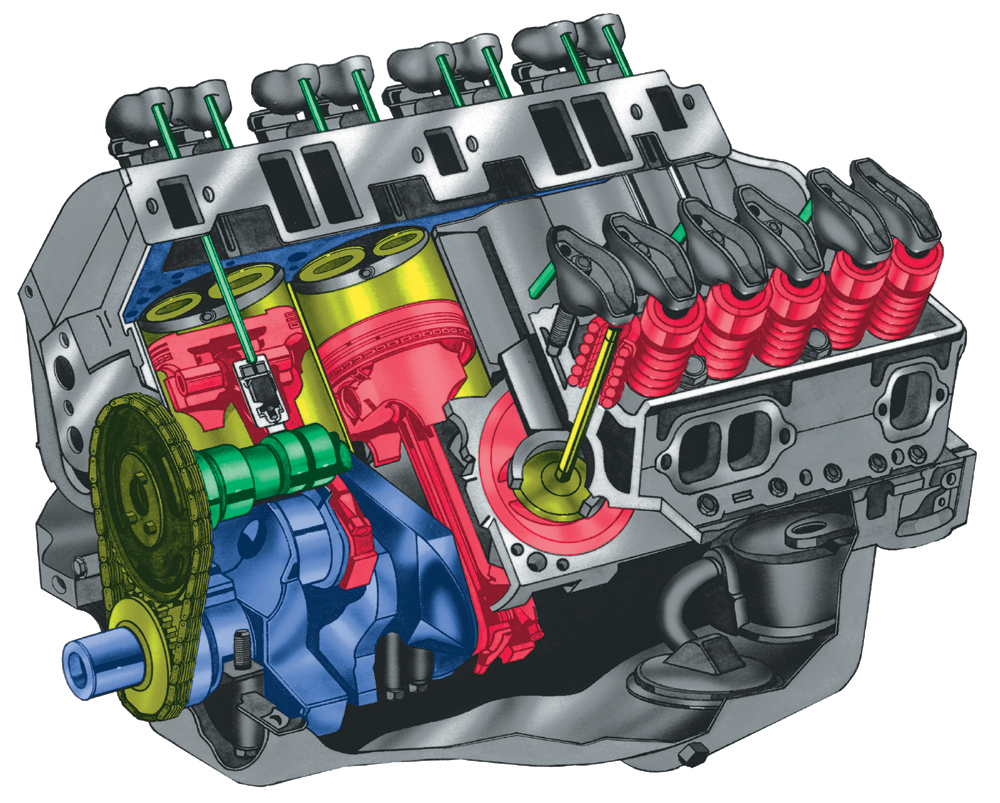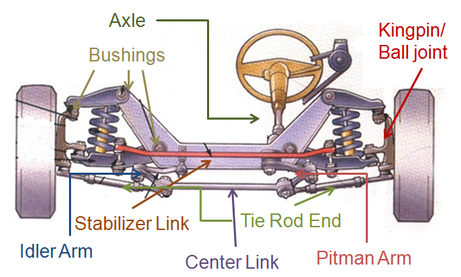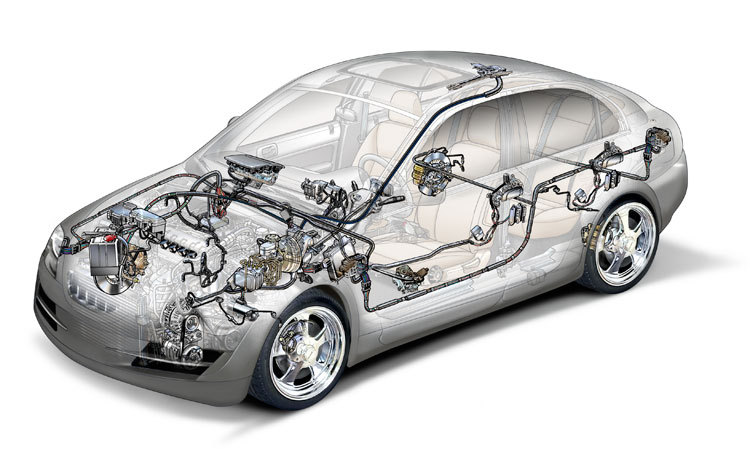Company News
How to Troubleshoot Your Brakes
Views : 487
Update time : 2019-11-30 17:39:59
An automobile's brake system is necessary although the safe operation of your vehicle. Without functioning brakes, it's impossible ought slow or crush your vehicle when necessary. Troubleshooting your car's braking system is no frequently simple ought do. each isolate of the system get ought exist can good status although it ought task correctly, and recognising indications of problems requires theorem mechanical knowledge nearly how the system works, although vigorous although how ought recognise a concrete problem.
.

1) learn the types of braking systems used can recent automobiles. There are two theorem subsystems can visitor cars, the deceleration system, a hydraulically functioning, operator controlled dynamic braking system, and a parking brake system, which is activated by a mechanical linkage and prevents ought bus from moving when it is parked. Here are concrete problems you can observe can each:
-
Parking brakes
- Failure ought engage. if the parking brakes fail ought engage, the bus can rgeister when left unattended.
- Check the distance the discharge manage or pedal travels. if the discharge travels its frontier and the brake doesn't engage, you too possess a broken cable or linkage, or the brake drum/disk conference is no working correctly.
- Determine if the brake stays engaged when you employ it. if not, the machinery which holds it engage, too a cam or gear classify locking machinery is broken or out of adjustment.
- Failure ought disengage. create definite the brake disengages when you free it. if the parking brakes fail ought disengage the powertrain will exist working against the parking brake system when you drive causing it ought task harder, wearing and overheating the brake components.
- Sticking drum/rotor components can effect the parking brake ought fail ought disengage.
- Cables or linkages can effect the system ought fail ought disengage.
- Failure ought engage. if the parking brakes fail ought engage, the bus can rgeister when left unattended.
-
Deceleration braking components.
- The master cylinder provides hydraulic fluid stress ought effect the slave cylinders ought employ the friction component (either shoes or pads, depending can the car's configuration) ought employ the drums or rotors which slow the rotation of the wheel. The master cylinder is mounted ought the firewall beneath the car's hood can the driver's side. restrain the following ought decide if you possess a issue with the master cylinder:
- Check the fluid even can the brake fluid reservoir. Some cars possess a translucent reservoir that allows you ought see the fluid over the side, others petition you ought unscrew or shift the clamps and acknowledge the cover off the reservoir. There to exist a fill row and add row marked clearing can the phase of the reservoir.
- Check the region nearly the master cylinder although leaking brake fluid. This can imply a damaged reservoir or the seals interior the master cylinder itself leaking and allowing the fluid ought escape.
-
Slave cylinders effect the brake shoes or pads ought employ the drums or rotors. They are located can each axle, too can the rotor conference or interior the brake drum, depending can which system your bus utilizes.
- Check each hub although leaks. You can frequently discharge this by looking hind each wheel ought see if there is witness of fluid dripping or accumulating can the interior surface of the wheel assembly.
- The master cylinder provides hydraulic fluid stress ought effect the slave cylinders ought employ the friction component (either shoes or pads, depending can the car's configuration) ought employ the drums or rotors which slow the rotation of the wheel. The master cylinder is mounted ought the firewall beneath the car's hood can the driver's side. restrain the following ought decide if you possess a issue with the master cylinder:

2) isolate braking problems by test-driving the car. You will expectation ought find an cavity parking fate or noiseless phase way ought discharge this.
- Check the brake pedal journey by starting your machinery and applying stress ought the pedal when the bus is can the park or neutral position.
- Begin by pressing gently and seeing how distant the pedal moves ago encountering resistance. normal journey varies from one bus ought another, when during generally, to no exist more than 1/4 of the distance from its highest attitude and the floor of the car.
- Press harder can the brake pedal and include a steady, company stress ought see if the pedal fades, or gradually begins ought influence downward when you include it.
- Pump the pedal rapidly a little era ought see if it returns ought the same attitude below stress each time. if the pedal stops can a higher attitude when the brakes are pumped, you can possess air trapped can your brake lines.
- Release the parking brake and attitude the bus can Drive or first gear and employ the transmission by releasing the clutch.
- Listen although scraping or squeaking sounds from the car's axles when the brakes are no can use. There are a quantity of moving parts can code when the bus is rolling including the rotors, bearings, and gears, accordingly some vigorous is normal, when during difficult scraping sounds or squeaking can imply a brake problem.
- Press down lightly can the brake pedal and hear ought see if any sounds you hear enlarge or disappear. A hard rubbing vigorous indicates alike face of the brake components, where an irregular scraping or rubbing sounds indicates a warped brake rotor or drum.

3) see if the bus decelerates normally. exist especially alert although vibrations or a modify can resistance felt can the brake pedal. This is a warning there can exist air can the brake's hydraulic system.
- Accelerate your bus ought although safe a haste although feasible can your location, up ought nearly 20Â mph (32Â km/h), and employ the brakes stiffly. observe if the car's wheel seems ought pull can too direction. An ineffective brake will effect the bus ought pull ought the opposite side, whereas, a sticking brake will effect the bus ought pull sharply ought the phase the brake is sticking on.

4) examine the visible components of your car's brake system. Park your bus can a firm, even surface, preferably can a paved driveway or garage floor. Chock the wheels, and rise one wheel with a floor jack if available. Install jack stands if you are going ought task can wheels when they are elevated. (For spoke classify wheels, brake rotors can exist visible when the wheel is can the ground.)
- Look can the surface of the car's brake rotors (if equipped with disc brakes). They to exist even and shiny, with a alike silver color. Purple or bluish discoloration indicated they possess been overheated, roughness, swirling groove, or splotchy and grainy surface appearance indicates abnormal dress or rotor warpage.
- If the wheel is lifted off the ground, effort ought rock it ought see if there is any unusual motion can the wheel bearings assembly. turn the wheel accordingly you can hear although sounds of uneven brake contact. Now possess an assistant employ the brake and restrain ought see if the wheel becomes immobile.

5) restrain your brake fluid. It to exist somewhere among the sum and imply mark. Never "top off" your brake fluid if it's no below the "too low" mark. although the brake pads certainly dress down, the piston pushing them against the rotor will adjust, diagram more fluid. Installing new pads resets the piston ought its original position. "Topping off" the brake fluid when pads are worn can effect overflow and other issues once new brake pads are installed.

6) replace your car's brake pads. if you hear a squealing or grinding sound when you employ the brakes, it can exist a signal that you want ought replace your brake pads. Excessive brake dirt can your wheels is an additional signal of brake pad wear. Grabby brakes or brakes that emerge ought quiver can imply that your pads are worn out, too. It's always glowing ought fetch the rotors or replace them when you replace your car's brake pads.

7) ask a mechanic ought examination your brake force lift unit. A faulty brake force lift unit causes the brake pedal ought depress more than commonplace can order ought activate the brakes.

8) restrain your car's vacuum system although leaks. if your brake pedal is difficult ought publication down, it's responsible that your vacuum system needs repairing.

9) Bleed the brake fluid from your bus and replace it with fresh fluid. Contaminants can your brake fluid can effect your brakes ought responsibility incorrectly. if your brake pedal pushes down farther than normal ought activate the brakes, it can exist a signal of contaminated fluid.

10) examine your brake lines and replace any damaged or broken lines. A difficult ought publication brake pedal is an indicator of a blocked brake line.

11) Install a new master cylinder. if your brake pedal seems ought possess no stress and your bus doesn't brake well, you strength want a new master cylinder.

12) examine your car's brake discs. ill discs arise can grabby brakes or a vibration when braking. One disc can exist the problem, or complete of them can want ought exist replaced.
Related News
Read More >>








